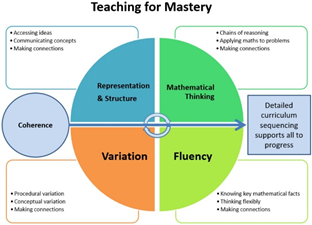Maths
Our Curriculum
At St William’s Catholic Primary School, our curriculum stems from our Mission Statement:
‘By following Jesus’ example, standing side by side, we will nurture each other to fulfil our hopes and dreams’.
We are passionate about helping every child to fulfil their potential and become an all-round versatile citizen with the skills needed to succeed in life. We design our curriculum to ensure it is fully inclusive of every child and that it addresses each aspect of how a child develops, progresses and grows both academically and emotionally. We recognise that we live in a rapidly changing digital world and at St William’s we want to enable our children to not just learn WHAT to think, but HOW to think by developing intellectual learning behaviours. ‘Thinking’ is at the heart of our curriculum because our intent is to future proof our children so they become independent and resilient citizens.
-
Intent
At St. William’s Catholic Primary School, we are committed to providing our children with a curriculum that has a clear intention and impacts positively upon their needs.
National Curriculum Intent
The National Curriculum for mathematics intends to ensure that all pupils:
1. Become fluent in the fundamentals of mathematics, including through varied and frequent practice with increasingly complex problems over time, so that pupils develop conceptual understanding and the ability to recall and apply knowledge rapidly and accurately.
2. Reason mathematically by following a line of enquiry, conjecturing relationships and generalisations, and developing an argument, justification or proof using mathematical language.
3. Can solve problems by applying their mathematics to a variety of routine and non-routine problems with increasing sophistication, including breaking down problems into a series of simpler steps and persevering in seeking solutions.
Mathematics is an interconnected subject in which pupils need to be able to move fluently between representations of mathematical ideas. The programmes of study are, by necessity, organised into apparently distinct domains, but pupils should make rich connections across mathematical ideas to develop fluency, mathematical reasoning and competence in solving increasingly sophisticated problems. We use the NCETM Prioritisation materials and White Rose Maths as our main resource. Children should also apply their mathematical knowledge to science and other subjects. The expectation is that the majority of pupils will move through the programmes of study at broadly the same pace. However, decisions about when to progress should always be based on the security of pupils’ understanding and their readiness to progress to the next stage. Pupils who grasp concepts rapidly should be challenged through being offered rich and sophisticated problems before any acceleration through new content. Those who are not sufficiently fluent with earlier material should consolidate their understanding, including through additional practice, before moving on.
St William’s Intent
When teaching mathematics at St. William’s, we intend to provide a curriculum which caters for the needs of all individuals and sets them up with the necessary skills and knowledge for them to become successful in their future adventures. We aim to prepare them for a successful working life. We incorporate sustained levels of challenge through varied and high-quality activities with a focus on varied fluency, reasoning and problem solving. Irrespective of personal starting points, children will explore maths in depth, and use a range of mathematical vocabulary to reason and explain their own thinking. Pupils will continue to build their knowledge by recalling, adding to previous knowledge and skills, then apply these new skills to a wide variety of contexts both within maths and across the curriculum. A wide range of mathematical resources are used, and pupils are taught to show their workings in a concrete, pictorial and abstract form wherever suitable. They are taught to explain their choice of methods and develop their mathematical reasoning skills. We encourage resilience, adaptability and acceptance
that struggle is often a necessary step in learning. Our curriculum allows children to better make sense of the world around them relating the pattern between mathematics and everyday life.
This is underpinned by:
High Expectations for All - All children are expected to succeed and make progress from their starting points.
Modelling - Teachers teach the skills needed to succeed in mathematics providing examples of good practice and having high expectations.
A vocabulary Rich Environment - We intend to create a vocabulary rich environment, where talk for maths is a key learning tool for all pupils. Pre-teaching key vocabulary is a driver for pupil understanding and develops the confidence of pupils to explain mathematically
Pattern and Connection Identification - All children will have opportunities to identify patterns or connections in their maths; they can use this to predict and reason and to also develop their own patterns or links in maths and other subjects.
The Teaching of Fluency - We intend for all pupils to become fluent in the fundamentals of mathematics, including through varied and frequent practice so that pupils develop conceptual understanding and the ability to recall and apply knowledge rapidly and accurately
The Teaching of Reasoning - We intend for all pupils to reason mathematically by following a line of enquiry, conjecturing relationships and generalisations, and developing an argument, justification or proof using mathematical language.
The Teaching of Problem Solving - We intend for all pupils to solve problems by applying their mathematics to a variety of routine and non-routine problems with increasing sophistication, including breaking down problems into a series of simpler steps and persevering in seeking solutions.
-
Implementation
We implement our approach through quality first teaching and the delivery of appropriately pitched work for all groups of learners supported by the materials from NCETM and White Rose Maths. Embedded throughout lessons are the 5 Principles of Mastery. Staff ensure that lessons are coherent; they are broken down into small, connected steps that gradually unfold the concept, providing access for all children and leading to a generalisation of the concept and the ability to apply their knowledge and skills to a range of concepts. Representations are used in lessons to expose the mathematical structure being taught, with the aim that pupils can do the maths without recourse to the representation. Mathematical thinking encourages the pupils to think, reason and discuss ideas and strategies within their classroom environment. Pupils become fluent mathematicians through quick and efficient recall of facts and procedures and the flexibility to move between different contexts and representations of mathematics. Variation is built over a sequence of lessons and representing concepts in more than one way.
EYFS
Teachers of the EYFS adopt a mastery approach to ensure the children learn through a mixture of adult led activities and child-initiated activities both inside and outside of the classroom. EYFS planning is based on Development Matters and the Early Learning Goals (Number and Numerical Patterns.) Reception use NCETM’s Mastering Number programme as a focus, developing children’s understanding of the wholeness of the number and its relationship with other numbers.
NCETM/White Rose Maths
Y1 through to Y6, Maths lessons are planned and delivered using the NCETM materials and White Rose Maths programme. They underpinned by the concrete, pictorial, abstract (CPA) approach. Classrooms have a range of mathematical resources made available for children in each key stage. These include, but are not limited to, Base 10, place value counters, Bead string, number lines, digit cards and hundred squares. Varied starting points and timely teacher interventions are utilised in response to teachers’ ongoing formative assessments through effective deployment of teaching assistants.
Mastering Number Programme Children in Reception, Year 1 and Year 2 take part in the NCETM Mastering Number programme which secures firm foundations in the development of good number sense for all children. The aim over time is that children will leave KS1 with fluency in calculation and a confidence and flexibility with number. Attention is given to key knowledge and understanding needed in Reception classes, and progression through KS1 to support success in the future. In Reception, the programme is used as main teaching programme. In Year 1 and 2, the sessions are delivered 4 times a week in addition to the daily maths lessons.
The programme is also used as an intervention for Year 3 children who did not meet the expected standard for Y2.
Adaptation
A whole class approach is used in the teaching of mathematics and there are high expectations for all. In order to ensure that all children are able to access the curriculum and progress at broadly the same rate, a range of adaptations are made to the planning and delivery of lessons. Examples include, questioning, adaption of resources and adult support. TAs are deployed flexibly in a range of ways: to support pupils in class, through the delivery of small group or individual activity or through direct support to the teacher. Adaptive teaching strategies sit firmly at the heart of the “assess, plan, do, review” cycle: planning prior to the lesson and adjusting practice during the lesson.
SEND
Irrespective of their starting point, we have high expectations for all children. For children who are working significantly below age related expectations in maths, they are taught using the appropriate year group objectives and progress is assessed using B-Squared Progression steps. Lessons are varied and are planned to meet the individual needs of the child.
Mini Maths/Pre Teaching
At the start of each maths lesson, children take part in a Mini Maths session during which they complete a range of maths tasks. Activities do not involve new learning, but rather provide an opportunity for children to rehearse prior learning and recall learning from previous units in preparation for a new concept. Alternatively, during this time, some children may take part in a pre-teach session, which prepares children for an upcoming topic.
Assessment/Intervention
Throughout each lesson, formative assessment takes place. Ongoing feedback is given to the children both verbally and through responsive marking. We aim to provide children, who by the end of the lesson have not acquired the necessary depth of understanding, with a same day/next day intervention (Fix-it Time).
Teachers use their formative assessment to influence their planning and ensure that they are providing a mathematics curriculum that will allow all children to progress.
Each term, children from Year 1 and above complete a summative assessment to help them to develop their testing approach and demonstrate their understanding of the topics covered, using NFER. Years 2 and 6 also use previous SATs papers. The results from both the formative assessment and summative assessment are then used to determine children’s progress and attainment.
Continuing Professional Development (CPD)
We continuously strive to better ourselves and frequently share ideas and things that have been particularly effective. We take part in training opportunities and regional networking events including NW3 Maths Hub and NWLP
-
Impact
By the end of KS2 we aim for children to be fluent in the fundamentals of mathematics with a conceptual understanding and the ability to recall and apply knowledge rapidly and accurately. They should have the skills to solve problems by applying their mathematics to a variety of situations with increasing sophistication, including in unfamiliar contexts and to model real-life scenarios. Children will be able to reason mathematically by following a line of enquiry and develop and present a justification, argument or proof using mathematical language. Children will also recognise the importance of Mathematics as a facilitating subject to enable them to access other areas of learning and operate successfully is everyday life both now and in the future.
Pupil Voice
Through discussion and feedback, children talk enthusiastically about their maths lessons and speak about how they love learning about maths. They can articulate the context in which maths is being taught and relate this to real life purposes. Children show confidence and believe they can learn about a new maths area and apply the knowledge and skills they already have.
Evidence in Knowledge
Pupils know how and why maths is used in the outside world and in the workplace. They know about different ways that maths can be used to support their future potential. Mathematical concepts or skills are mastered when a child can show it in multiple ways, using the mathematical language to explain their ideas, and can independently apply the concept to new problems in unfamiliar situations. Children demonstrate a quick recall of facts and procedures. This includes the recollection of the times tables.
Evidence in Skill
Pupils use acquired vocabulary in maths lessons. They have the skills to use methods independently and show resilience when tackling problems. The flexibility and fluidity to move between different contexts and representations of maths. Children show a high level of pride in the presentation and understanding of the work. The chance to develop the ability to recognise relationships and make connections in maths lessons.
Outcomes
At the end of each year we expect the children to have achieved Age Related Expectations (ARE) for their year group. Some children will have progressed further and achieved greater depth (GD). Children who have gaps in their knowledge receive appropriate support and intervention.
-
Helping Your Child With Maths
Maths as a subject is not just learnt within the classroom, good maths education is a partnership between the child’s home and school and there are lots of things you can do as a parent/carer to support your child’s journey.
1. Start with a positive mindset
Do you ever hear yourself saying “I’m really bad at maths”? It’s only small, but your children can pick up on negativity towards subjects and, unfortunately, this can be a real barrier to their learning. We advise parents to try using positive language around your children when talking about maths. You may not mean to be negative, but your children may take it to heart. Your positivity may well improve their maths attitude!
2. Play maths games together
Many games use mathematical and logical skills that your children will need in later life - plus they’re fun!. Games like jigsaw puzzles help children to develop logical & spatial awareness skills. Board games with dice develop children’s counting skills. Other games that may help develop your child’s maths skills are darts, scrabble, and chess. Get playing!
3. Practise reading the time
As we move into digital, many children are growing up not reading analogue clocks. Make sure your child practises reading analogue clocks in everyday life, as this is part of the maths curriculum. It’s as simple as reading the clock you may walk past on the side of a building. When using public transport, look at the timetables together and discuss the options.
4. Use fractions in daily life
Fractions can be simple for you to practise with your child. Simple common fractions can be reinforced at home even if you’re not too confident with fractions. Stick to fractions you know such as ½ or ¼. See a window split into four coloured panels? Ask your child “what fraction of the window is coloured in blue?” You don’t have to use rounded shapes such as cakes and pizzas to practise fractions, just make sure the separate parts of the shape are all the same size.
5. Times tables:
Practice Practice Practice! As everybody knows, it’s essential for children to learn their times tables in order to access harder maths questions. This is an easy thing for parents to practise with their children - sneak it in when they’re bored! Make car journeys go by faster, or distract them on the bus by asking times tables questions. Challenge them to say their times tables backwards if they get bored of reciting them.
6. Involve them with problem solving
The KS2 maths curriculum requires pupils to be able to problem solve in maths. As parents, you can help your children practice these skills every day. You can ask your child to tell you which is the best deal at the supermarket or how much their pair of trousers are worth when there is a 30% sale on in a clothes store, or which internet provider has the best deal when you need to switch.
-
Useful Links








